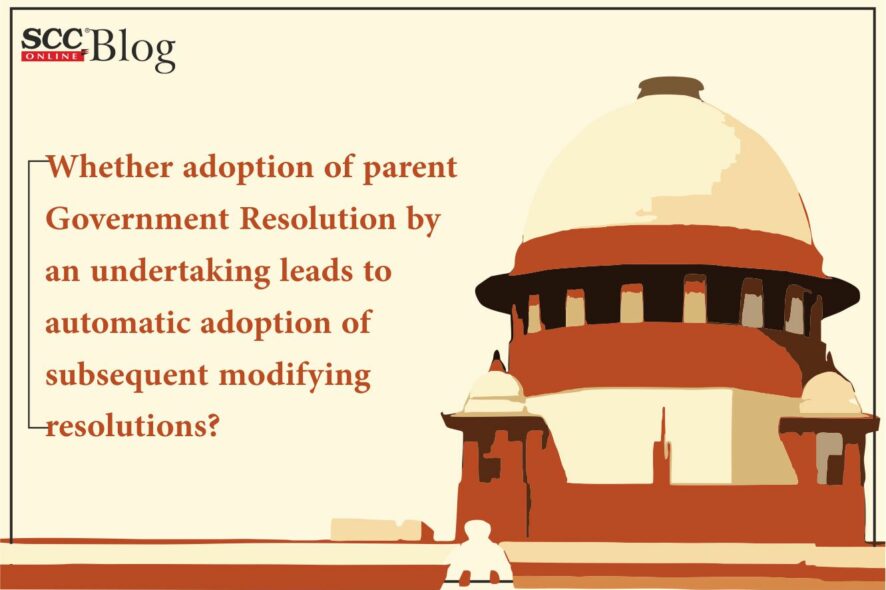Supreme Court: The Division Bench of Dr Dhananjaya Y Chandrachud and M. R. Shah*, JJ., held that equation of posts and salary is a complex matter which should be left to the expert body and undertakings. Opining that granting of pay parity by the Court may result in a cascading effect having adverse consequences on employer, the Bench reminded,
“There are limitations or qualifications to the applicability of the doctrine of ‘equal pay for equal work’.”
The instant appeal was filed against the order of Gujarat High Court in Letters Patent Appeal by which the High Court had quashed and set aside the judgment and order passed by the Single Judge whereby the Single Judge had held that the appellants were entitled to the pay scale of Rs.950-1500 with all consequential benefits upon completion of 10 years of service and revised pay scale as per 5th, 6th and 7th Pay Commission scales.
Background
With a view to resolve the issue relating to service condition of daily wagers engaged in maintenance and repairing work a committee called ‘Shri Daulatbhai Parmar Committee’ was constituted under the Chairmanship of the then Minister of Roads and Building Department–Shri Daulatbhai Parmar. On the recommendation of Parmar Committee, the Government of Gujarat passed a Resolution dated 17-10-1988 to give certain benefits to the skilled daily wager workmen depending upon the period of services undergone, i.e. less than 5, 5 or more or 10 years.
That the Respondent–Gujarat Water Supply and Sewerage Board adopted the said Government Resolution by way of communication dated 08-06-1989 and accordingly, all the daily rated employees working with the Board including the original petitioners were granted the benefit of the pay scales of Rs.750 and other benefits upon their completion of 5 years services.
The Bone of Contention
Noticeably, the Government issued subsequent Resolutions dated 01-05-1991 and 15-02-1992 by which certain modifications were carried out in the parent Resolution dated 17-10-1988 and it was provided that such daily wagers who were SSC passed and had completed 7 years, the Department would assign administrative work of clerical cadre Class III and they should be paid pay scale of Rs.950-1500 from the date of assignment of duty.
The appellants–daily rated employees were claiming the benefit flowing from the aforesaid subsequent Government Resolutions mainly on the ground that other similar daily rated employees had been granted the benefit and therefore not extending such benefits to other daily rated employees was discriminatory and violative of Article 14 of the Constitution.
Factual Analysis
Evidently, the Board never adopted the subsequent Resolutions while the parent Resolution was specifically approved by the Board vides communication dated 08-06-1989. On the contrary the administrative instructions vide communication dated 29-08-1991 were issued to all the Chief Engineers of zonal offices that benefits pursuant to Government Resolution of 1991 were not to be granted to the daily rated employees of the Board.
Therefore, the Bench was of the view that as such the Board which is an autonomous and statutory body created under the Gujarat Water Supply and Sewerage Board Act, 1978 never adopted the subsequent Government Resolutions and unless the said Resolutions were adopted by the Board, the daily rated employees working with the Board shall not be entitled to the benefits flowing from the subsequent resolutions.
Upholding the decision of the Division Bench, the Court held that daily rated employees of the Board cannot claim the benefits from the Resolutions of 1991 and 1992 as a matter of right as they do have any right to get the benefits flowing from the aforesaid Resolutions till specifically adopted by the Board like adoption of the parent Resolution dated. The Bench stated,
“There shall not be automatic adoption and/or applicability of the subsequent resolutions.”
The Bench added, the Board is an independent entity and it might have its own financial capacity and therefore its employees cannot claim parity with the employees of the State Government. The State Government and the autonomous Board/bodies cannot be put at par as the Board has to depend upon their own financial resources and it is ultimately for the Board to take a conscious decision which can be termed as a policy decision on the pay scales to be adopted and/or certain benefits which would have financial implications. Everything depends upon its economic viability or the financial capacity, otherwise the unit itself may not be able to function and may have to close down inevitably and have disastrous consequences for the employers themselves.
Conclusion
In the above backdrop, the Bench opined that the daily rated employees of the Board cannot invoke Article 14 of the Constitution to claim benefit on the ground of parity if they otherwise are not entitled to such benefit as Article 14 cannot be invoked to perpetuate illegality and irregularity. Accordingly, it was held that the Single Judge erred in directing the Board to grant the benefits flowing from the subsequent Government Resolutions which was rightly set aside by the Division Bench of the High Court.
[Rajesh Pravinchandra Rajyaguru v. Gujarat Water Supply & Sewerage Board, CIVIL APPEAL NO. 7578 OF 2021, decided on 17-12-2021]
Kamini Sharma, Editorial Assistant has pit this report together
Appearance by:
For the Original Petitioners: Sanjay Parikh, Senior Counsel
For the Board: Aastha Mehta, Advocate
*Judgment by: Justice M.R. Shah






